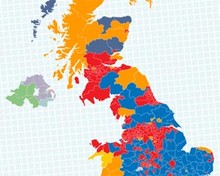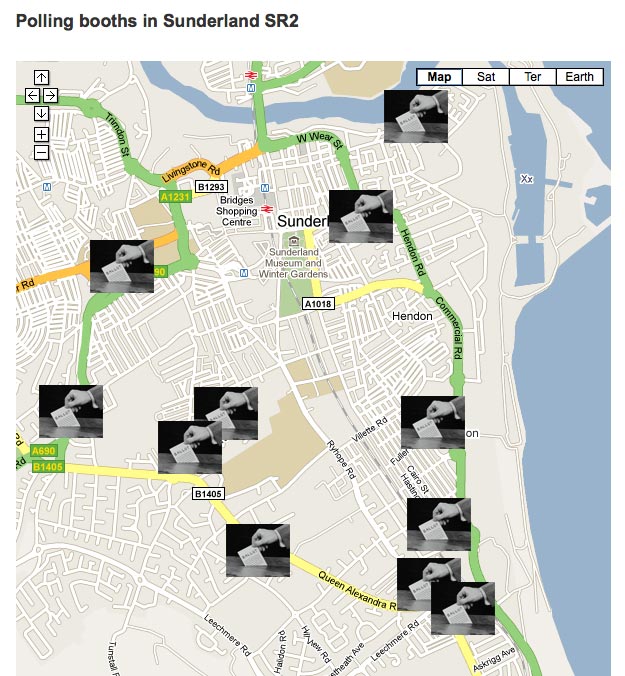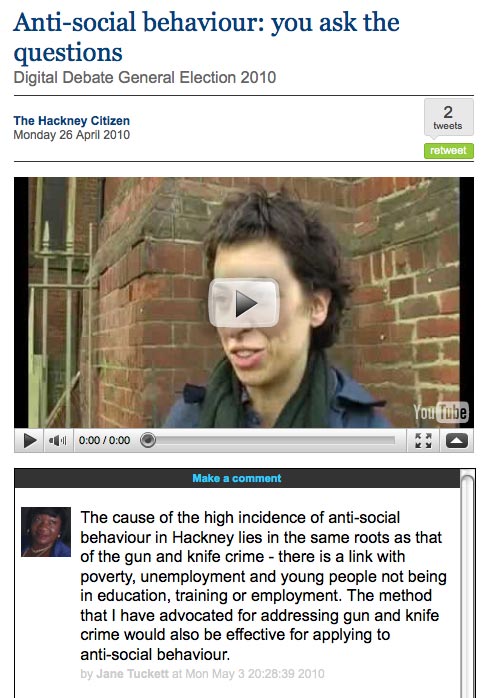
It's a very different set-up from his coverage of the last election as a journalist for Sky News, Jones says. He launched Saddleworth News in February after moving to the area last year. "I didn't want to just turn up to an area and be a commuter. This area has a strong identity and not much media."
Covering the build-up to the general election with his site has allowed Jones to sate his own interests as a political news junky, but it is also tapping into local demand for this type of news: having interviewed and published more than 20 audio interviews with prospective parliamentary candidates for local seats and councillors vying for a seat in the simultaneous local council election, the site can go deeper than other local news media in the area, he says.
"Although mainstream media are covering the campaign, they've not done these interviews, but just put up personal statements and manifestos from candidates instead. I can do what I want and I'm not restricted by space or time," he explains, adding that the interviews he conducted with the council candidates are the most popular he's put on the site.
Jones' site is just one example of hundreds of hyperlocal blogs and websites covering the UK election. Some are run by journalists like Jones, but others come from individuals and groups of citizens motivated by other reasons.
The role of local media as a public watchdog and means of holding local authorities and institutions to account has been repeatedly cited as the reason for protecting its place in the pecking order of UK news media. But as a Society of Editors report last week suggests, a lack of funding to support public service reporting initiatives, such as that proposed by the Press Association, is hampering this lofty aim.
Could independent and hyperlocal news sites offer an alternative, filling in the gaps left by bigger media counterparts? The coverage of the UK election may be the opportunity to test this out and to show mainstream media groups what they can learn from the way these sites and blogs operate and from the way they cover politics at a truly local level.
None of the sites Journalism.co.uk spoke to wanted to replace local newspapers or other local media. Some are actively trying to work with their mainstream counterparts, such as Sunderland's SR2 Blog, which is embedding livechats with local candidates conducted by newspaper the Sunderland Echo. Most think there's room to co-exist with other sites and titles, particularly those run by non-journalists or by groups whose motivations may be very different from those of the local paper.
In south east London, community site Brockley Central can happily co-exist with bigger news groups, says co-editor Nick Barron. The site gets "some traffic and credibility" as one of the sites aggregated by the Guardian in its coverage of London politics, he says. For the election it has run a series of "virtual hustings" with two local candidates and has tried to remain as politcally neutral as possible by getting readers to post questions.
"I also talk regularly to the local newspaper journalists that cover the area and we link to each other's stories. Occasionally, I provide them with quotes about Brockley issues," he says.
"I think the key difference is that I am not writing dispassionately about the community I cover - Brockley Central is part-campaign group, part-community forum and part-news outlet. Many of my stories come from readers themselves, who probably feel they have a stake in the site and a relationship with me as the editor that they don't have with their local newspaper reporter, who has to cover a much wider beat and who has a degree of distance placed between themselves and the reader as a result of the format and style of local newspapers and their websites, which don't encourage much interactivity.
"On the other hand, I am not a professional and have a day-job, which means I can't offer the breadth of coverage that a local newspaper does. Some would argue that since a site like mine has a highly-personal style, that it tends to put-off some readers who don’t agree with me or relate to my writing. I recognise this is a potential problem, although I do try to cover the full breadth of local community life."
 While SR2 Blog's editor Josh Halliday is also keen to work in collaboration with his local newspaper on future projects, he feels his site can deliver a more granular picture of the general election.
While SR2 Blog's editor Josh Halliday is also keen to work in collaboration with his local newspaper on future projects, he feels his site can deliver a more granular picture of the general election."The obvious thing hyperlocal sites offer that big media necessarily can't is giving wards the attention they deserve. Where the local paper can only do five pars on a ward, I will have done 5,000 words since the start of the year. We can also do plurality of voices - a two par vox pop in the local paper can be a guest post and resultant conversation on SR2 Blog," he explains.
Saddleworth News' Jones feels the same: interviewing candidates with a "non-confrontational style" allows them to go beyond the party-political bullet points of many interviews. As a journalist with experience of mainstream media's approach to UK elections, covering from a hyperlocal level highlights different campaign issues and priorities amongst voters: "This time I'm following the real election. You do see things differently. The issues on the ground here are jobs, expenses and transport."
While trying to balance his site's coverage of the election between exclusively local news items and issues of national significance arising from his area, Michael Casey, editor of video news site Your Thurrock, says hyperlocal websites can provide a level of detail missed by most news organisations. This is partly the result of having to cover so many other stories and subject areas and a question of resources, acknowledges Casey - smaller, independent sites can be more flexible in their approach. Taking the hyperlocal view shows a different picture of UK politics and campaigning outside of the mainstream media's agenda, says Casey, and there are important stories in this. For example, through reporting for the site he saw how local Conservative councillors in Thurrock, for example, didn't turn up to David Cameron's visit, and sees first hand the potential for politicians to make gaffes on a local level but escape national attention.
Opportunities for hyperlocals
Your Thurrock has turned its hyperlocal focus into a money-maker by selling on local footage to the BBC and ITN, something it hopes to benefit from on election night when it will cover the vote count live and provide instant, on-camera reaction to the results in Thurrock.
Hyperlocal, independent sites can play an important role in election coverage in terms of holding local democracy to account and documenting what happened, says Casey.
"I'd like to think that even if my site fails, people in 2030 and beyond will go to it to find out what went on in the 2010 election (…) With a 109 local papers going out of business in 2009, it's so important to be in court, in council meetings and covering events like this,” he says. There certainly seems to be a demand for political news on a local level: many of the sites Journalism.co.uk spoke with reported record traffic figures generated by their election coverage.
The Hackney Citizen, a site and quarterly print newspaper delivered in the N16, E8, E5 and E9 postcodes of the north London borough, had its biggest day for web traffic on the day it launched its "virtual hustings". The hustings - video questions posed by voters and answered by candidates in a liveblog beneath - have provided an opportunity to hear from the electorate and not just PPCs, who's voices so often dominate election coverage, says the Citizen's Keith Magnum.
"The candidates get the chance to see proper citizens speaking rather than an abstract question. It's relatively easy to get an interview with a candidate in our area and lots of other sites and blogs have done these well, so we wanted to something different and decided to go down the engagement route," he says.
For Magnum the election content has been an experiment and an opportunity to try out new technologies on the site, but it also has the potential to shape what such sites cover in the future.
"The election coverage has certainly stirred the site up a bit. From getting the first BNP leaflet with Churchill's face on it, to searching for the missing Lib Dem literature, everyone's had something to say on it - usually on Facebook and usually about being sick of politics," says SR2 Blog's Josh Halliday.
"We haven't got the resource to carry council chamber news day-to-day, though we do report on all geographically relevant planning sub-committee meetings etc. This local government election - being our first - has brought us into contact with a wide variety of local political kingmakers so I hope to have an inside track on a few things post 6 May."
 Flexibility and an ability to link up with third-party sites and tools more easily because of their independent status could counter this lack of resource for hyperlocal sites. The Hackney Citizen's use of video and ScribbleLive, for example, is in stark contrast to Archant's website for the Hackney Gazette, which does not allow reader comments directly below articles, says Magnum.
Flexibility and an ability to link up with third-party sites and tools more easily because of their independent status could counter this lack of resource for hyperlocal sites. The Hackney Citizen's use of video and ScribbleLive, for example, is in stark contrast to Archant's website for the Hackney Gazette, which does not allow reader comments directly below articles, says Magnum.Outside of the mainstream it can be difficult to find the right information and data necessary to cover local politics and established news organisations are at an advantage in this respect, says Jones. But Jones says it's a case of knowing your strengths and weaknesses: there's little point chasing Gordon Brown with the press pack on a local visit just to put one question to him when he can aggregate the coverage of his visit as it happens.
Halliday will use social media sites to break news of the results ahead of the mainstream: "I've managed to get a place at the count on May 6 so I'll be at the coalface when the results are filtering out. Sunderland seats have been the first to declare for four elections now - I'm hoping if the tradition continues then I'll have the news on Twitter and on the blog before any other news providers. That would be my dream."
The relevancy of these sites to local campaigns also means local MPs and PPCs are reading them, providing an opportunity for hyperlocal sites to play a real role in holding local politicians to account.
"I'm lucky that many local politicians and officials recognise the site's value and respect our efforts to provide balanced and positive coverage of the area," says Brockley Central's Barron. "I encourage them to post on the site, quote them where appropriate, link to their own blogs and offer them by-line articles on issues that they’re particularly interested in. Their interest in the site is obviously helped by the size of its audience - around 10,000 visits a week and rising."
For these sites it seems the general election has contributed to growing their audiences and their influence on a local level. As a testing ground for them, the election may show what they can achieve and what their rising audiences want; for the readers and local politicians it's a shift in the traditional media food chain that will continue no matter what the result on election night.
Free daily newsletter
If you like our news and feature articles, you can sign up to receive our free daily (Mon-Fri) email newsletter (mobile friendly).
Related articles
- Protecting independent journalism, with Lexie Kirkconnell-Kawana of IMPRESS
- Five key takeaways from the UK select committee on the future of news
- The first UK local news publisher gains charitable status
- New app uses geolocation to help local publishers boost ad revenue
- How MyLocal Lincolnshire and Ping! are innovating local media









